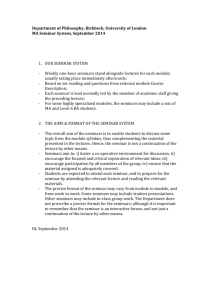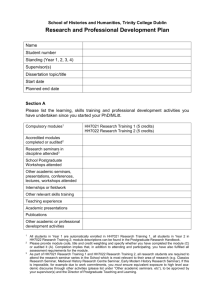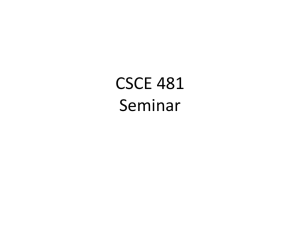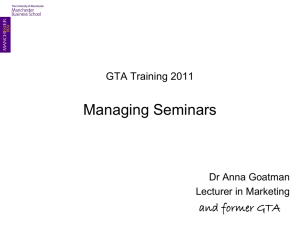the University Seminar Course Proposal Form
advertisement
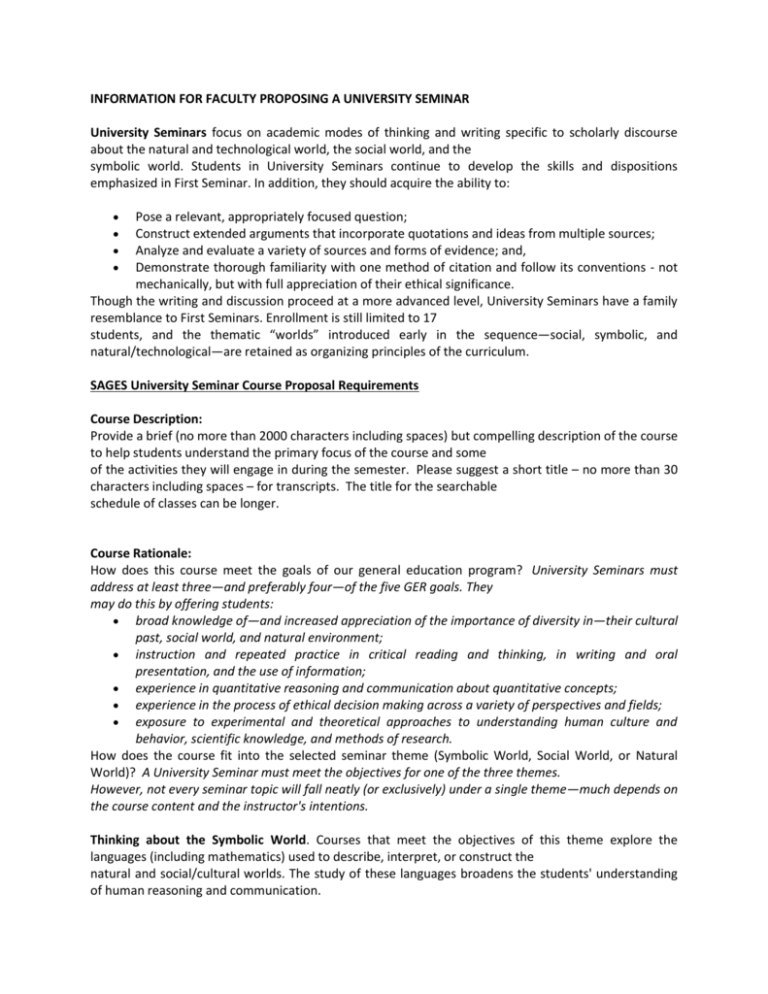
INFORMATION FOR FACULTY PROPOSING A UNIVERSITY SEMINAR University Seminars focus on academic modes of thinking and writing specific to scholarly discourse about the natural and technological world, the social world, and the symbolic world. Students in University Seminars continue to develop the skills and dispositions emphasized in First Seminar. In addition, they should acquire the ability to: Pose a relevant, appropriately focused question; Construct extended arguments that incorporate quotations and ideas from multiple sources; Analyze and evaluate a variety of sources and forms of evidence; and, Demonstrate thorough familiarity with one method of citation and follow its conventions - not mechanically, but with full appreciation of their ethical significance. Though the writing and discussion proceed at a more advanced level, University Seminars have a family resemblance to First Seminars. Enrollment is still limited to 17 students, and the thematic “worlds” introduced early in the sequence—social, symbolic, and natural/technological—are retained as organizing principles of the curriculum. SAGES University Seminar Course Proposal Requirements Course Description: Provide a brief (no more than 2000 characters including spaces) but compelling description of the course to help students understand the primary focus of the course and some of the activities they will engage in during the semester. Please suggest a short title – no more than 30 characters including spaces – for transcripts. The title for the searchable schedule of classes can be longer. Course Rationale: How does this course meet the goals of our general education program? University Seminars must address at least three—and preferably four—of the five GER goals. They may do this by offering students: broad knowledge of—and increased appreciation of the importance of diversity in—their cultural past, social world, and natural environment; instruction and repeated practice in critical reading and thinking, in writing and oral presentation, and the use of information; experience in quantitative reasoning and communication about quantitative concepts; experience in the process of ethical decision making across a variety of perspectives and fields; exposure to experimental and theoretical approaches to understanding human culture and behavior, scientific knowledge, and methods of research. How does the course fit into the selected seminar theme (Symbolic World, Social World, or Natural World)? A University Seminar must meet the objectives for one of the three themes. However, not every seminar topic will fall neatly (or exclusively) under a single theme—much depends on the course content and the instructor's intentions. Thinking about the Symbolic World. Courses that meet the objectives of this theme explore the languages (including mathematics) used to describe, interpret, or construct the natural and social/cultural worlds. The study of these languages broadens the students' understanding of human reasoning and communication. Thinking about the Natural/Technological World. Courses that meet the objectives of this theme explore the identification, description, experimental investigation, and theoretical explanation of physical, biological, or chemical phenomena, as well as development and dissemination of technology. Thinking about the Social World. Courses that meet the objectives of this theme introduce students to the methods and concepts critical to the understanding of human behavior and development, social organization, and historical change. These courses (like those for the Symbolic World) may also include the study of literature and of philosophical or religious ideas. How does this course fulfill the requirements of the University Seminar? In keeping with the SAGES goals for general education, this course will provide students with an introduction to the modes of inquiry commonly used in the art and humanities, or in the natural sciences and technology, or in the social sciences. It is taught at a general level without prerequisites beyond the First Seminar, and requires each student to think critically and analytically about how our understanding of a specific topic is influenced by evidence. The course is writing intensive, and discussion based. How will this course engage students in writing. Each University Seminar should devote at least 1/6th of the class time to writing instruction. Typically, University Seminars build upon and extend the writing skills developed in the First Seminar by including a longer paper - a 10-12 page researched essay that integrates primary and secondary source material, and also includes a bibliography. The total amount of writing is typically around 20-25 pages. How will this course support the seminar format? University Seminars should revolve around discussion and writing; they can include experiential learning, collaborative work, projects, and oral presentations. Reading Assignments: What will you assign students to read? Provide a list of reading assignments including references. Grading Criteria: How will you evaluate student performance in the course? Include a grading breakdown for the course. Example – 20% Class Participation 20% Oral Presentations/Group Projects 60% Written Assignments (15%, 15%, 30% assigned to 3 major assignments distributed across the semester) Syllabus: If you have crafted a syllabus, you are welcome to include it but it is not necessary at this stage. Please send this requested information to Peter Whiting. He will review the material and make a recommendation whether the course should receive one-time approval as a University Seminar and then forward the recommendation to the appropriate curriculum committee or person. He will prepare the course action form for submission to the appropriate individual or committee unless you would rather create it.

